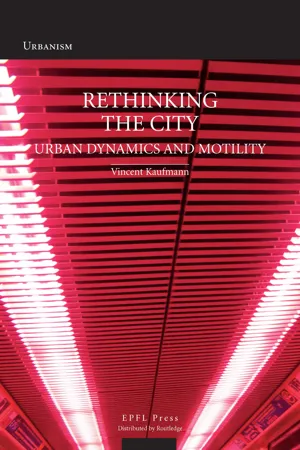
- English
- PDF
- Available on iOS & Android
Re-Thinking the City
About this book
Conditions for travel have changed and are still changing the world – a world experiencing what John Urry, among others, calls the 'mobility turn'. Since World War II we have been moving faster and going further – a fact that has profoundly changed our way of experiencing both the world and ourselves. The explosion of low-cost travel options has likewise had an important impact on the economy, lending to the globalization of markets and transformations in modes of production. Thus is it no longer possible to think of nation-states as autonomous vis-à-vis one another, nor of cities or regions as homogenous spaces delimited by clear-cut borders. In short, societies, like Western cities, are redefining themselves through mobility. What does this mean for the city, for its governability and governance? The goal of this book is to assess the urban implications of the mobility turn. It will likewise explore the modern urban phenomenon from the point of view of the mobility capacities of its players, i.e., their motility. In this same vein it asks that the reader consider the idea of a city or region as the product of an arrangement of a specific set of motilities.
Tools to learn more effectively

Saving Books

Keyword Search

Annotating Text

Listen to it instead
Information
Table of contents
- Table of contents
- Preface
- Acknowledgements
- Introduction
- 1 Rethinking urban theory
- 2 Defining mobility
- 3 Describing the city based on mobility
- 4 The individual motilities that make the city
- 5 The collective motilities that make the city
- 6 Artifacts and motility
- 7 The city as a potential host: ten facts regarding the mobility of cities and its governance
- Bibliography
- Index
Frequently asked questions
- Essential is ideal for learners and professionals who enjoy exploring a wide range of subjects. Access the Essential Library with 800,000+ trusted titles and best-sellers across business, personal growth, and the humanities. Includes unlimited reading time and Standard Read Aloud voice.
- Complete: Perfect for advanced learners and researchers needing full, unrestricted access. Unlock 1.4M+ books across hundreds of subjects, including academic and specialized titles. The Complete Plan also includes advanced features like Premium Read Aloud and Research Assistant.
Please note we cannot support devices running on iOS 13 and Android 7 or earlier. Learn more about using the app